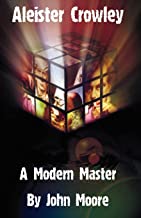John S. Moore
(Biography)

Aleister Crowley, A Modern Master
John S. Moore
Format: Softcover
ISBN:
£15.00/US$22.00
Subjects: Biography/Aleister Crowley/Magick/Thelema/Philosophy.
Click HERE for USA & AUS
Click HERE for UK
–
Aleister Crowley’s appeal on the level of popular culture has been well catered for by a number of biographies that have appeared in recent years, but the more intellectual side to him, which is equally fascinating, has not received so much serious treatment.
Crowley, A Modern Master is neither an account of his life, nor a straightforward presentation of his teaching, but an attempt to place him clearly in the context of modern ideas as well as a number of older traditions.
Extracts
Even, or even especially if you have little interest in the occult, Aleister Crowley deserves your attention. He applied his powerful intellect to engage with some of the most pressing issues of his own day, many of which remain as vital as ever. His Magick, and his Thelema, outlandish as they might at first sound, are not just fringe ideas, they offer provocative answers and solutions to many of the urgent questions that still beset us.
His message is meant for all, as he firmly states in the introduction to Magick in Theory and Practice. He challenged received opinion, which responded by cutting him out of serious history. Untangle his ideas from their bizarre sounding setting, and we can see how unjust was his exclusion. Most importantly, while received opinion has somewhat changed its character over the past sixty years it is still powerfully subverted by the life and work of this badly underrated great man.
My object is to make Crowley intelligible in a mainstream context, to bring his creative achievement more into the light of sympathetic attention, render his ideas more accessible, and his religious outlook and experience available. This involves rewriting much recent intellectual history. The object is also to make excuses for him, defending what has been criticised as the more contemptible side of his character. While my main target audience is people who already know about Crowley and are intrigued enough to want to explore the context of his ideas, I am also writing for anyone interested in modern thought who is curious to discover if I really can make a case for his importance.
The plan for this book was first conceived in 1984 as a contribution to the Fontana Modern Masters series. This was a series of paperbacks about the people who supposedly defined modernity, what is most creative and distinctive in the age in which we live in. I felt strongly that Crowley deserved a place among these assorted gurus. It was annoying, reading much of what was taken so seriously and admired, that the writings of this unique genius should be so completely disregarded. Knowing the prejudice against him I didn’t have any serious hope, but sent off a proposal all the same. I was told Crowley was not a suitable subject for inclusion. ‘From a publishing point of view’, I was told, he was ‘simply too different from the other people we have included as subjects’. This was of course to be expected. Ezra Pound, high priest of modernism, had been adamant there should be no place for the Beast, far preferring Crowley’s nemesis, Mussolini. I meant to show that Crowley is not so out of place in such company as is said.
John S. Moore
REVIEW
‘That John Moore thinks Aleister Crowley is one of the most important thinkers of the twentieth century can be in no doubt after reading what amounts to a 200 pages attempt of a rehabilitation of the great beast.
Moore is the first to admit that his book is a defence of Crowley. ”The object is to make excuses for him”, Moore asserts, ”defending what has been criticized as the more contemptible side of his character.” Moore has no interest in the simple retelling of Crowley’s life and works: pointing out that this has been done many times.Instead he aims to try to put Crowley’s thought, work and behaviour into context. In an attempt to make Crowley ”intelligible”, Moore expends many chapters in highly detailed examination of Crowley’s output. Texts and behaviour are examined in the light of ‘Romanticism’, ‘Protestantism’ and ‘Philosophy’, while what Moore describes as ‘Crowley’s sexual Stalinism’ is given an equally thorough examination.
This is not a book for those with no knowledge of Crowley or his work. John Moore expects that you will have heard of (if not be familiar with) Crowley’s main texts and, after a short but informative description of Crowley’s life, lauches the reader straight into the nitty-gritty.
If you are a devotee of Crowley and can see no wrong in him, or any of his behaviour, you will find this book greatly to your taste. I, for one, however found some of Moore’s rather blithe assertions hard to take. One such was that Crowley’s execrable behaviour towards the women in his life could be glossed over with ”His was an aristocratic path. Sex lives of true aristocrats in all their complexity are not reducible to simple formula for democratic consumption.” I’m afraid that doesn’t quite do it for me. Quibbles aside this is a really thought-provoking take on Crowley as a thinker, ego and possible guru. It highlights his huge creativity and determination to live as he believed he should, no matter the consequences: whether of drug abuse, sexual ‘addiction’, megalomania or accusations of debauchery. Well worth a place in any collection of Crowleyana.’
Pagan Dawn Samhain-Yule 2009
